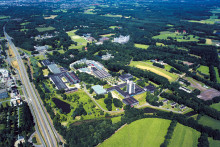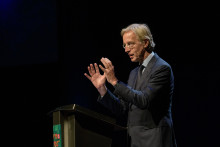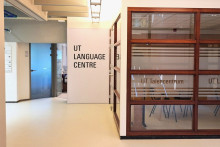For some, the COP26 climate summit in Glasgow was a success, while others felt that too little had been achieved. UT professor Vera Araujo Soares seems to belong to the latter group. She is involved in Scientists4Future - Twente, a platform for UT researchers who are concerned about the climate. ‘What I missed in the outcome of COP26 was a precise plan on how we are going to make it happen. The devil is in the detail. That's a missed opportunity.’
Recently, the members of Scientists4Future wrote an open letter to the Executive Board, in which they call for specific steps to be taken to achieve the university's climate goals. The letter has been signed over 600 times. Araujo Soares sees similarities between COP26 and the way the UT handles the climate problem. The vast majority of the university community recognizes the seriousness of the matter and there are several measures, but the UT must increase its pace, says Araujo Soares. 'I say this as a behavioural scientist: we will have to change our behaviour and mentality drastically, also at the UT.'
Wake-up call
Frieder Mugele, UT professor of Physics of Complex Fluids and also a member of Scientists4Future, agrees with her. ‘Last summer, we saw the dramatic consequences of extreme climate conditions, such as the heat waves and wildfires in Canada, the Mediterranean, and Russia or the floods closer to our homes. That should be a wake-up call.’ Araujo Soares shares his view. ‘As a mother of two, I don't want to stand by powerless. The implications of the IPCC report, which appeared last summer, are immense. The scientific evidence is there, now we have to get everyone on board to turn the tide. As the Northern Hemisphere, we also have an additional responsibility. Here we have the financial means to mitigate and adapt to the climate crisis, which are likely to be even worse in other parts of the world.'
Mandate
According to Mugele the Executive Board reacted positively to the open letter. The new board endorses the goals of Scientists4Future, he knows. ‘In fact, the goals that we ask to implement are the goals that were set by the Board in Shaping 2030, the official strategy of the UT. But it is extremely difficult to realize such a thing. That is why it is important that we send this letter to the Executive Board: if they take drastic measures, they must be assured of backing, the signatories of our letter give them a mandate.’
After all, some measures are going to hurt, says the UT professor. ‘Flying to conferences, serving meat in canteens and taking the car to work: all these things will have to be reduced substantially, says Mugele. 'That will not always be easy. People are creatures of habit. The big challenge is to get them on board. But the Covid pandemic taught us some lessons. Take for example working from home. We now know it is possible. And we see the benefits. We are no longer stuck in traffic every day.’
The scientists handed over the open letter today. They hope that the university board will take the recommendations to heart and set out on the road to a climate-neutral UT as quickly as possible. ‘There will probably be opposition,' says Mugele. But with our letter, the Executive Board knows they are supported.’

(Photo: the Executive Board receives the open letter from Frieder Mugele)







